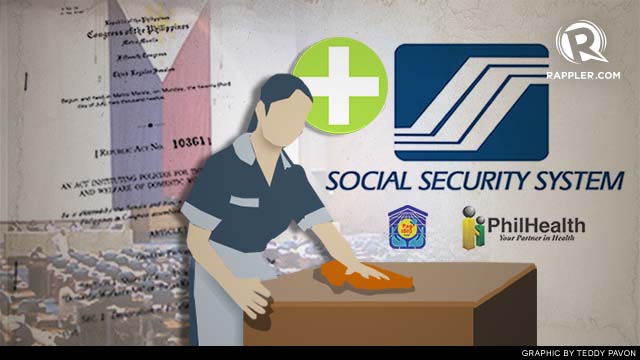SUMMARY
This is AI generated summarization, which may have errors. For context, always refer to the full article.

MANILA, Philippines – More household helpers are expected to register with the Social Security System (SSS), the state-owned pension fund, because of the Kasambay Law.
President Aquino signed Republic Act No. 10361, “An Act Instituting Policies for the Protection and Welfare of Domestic Workers” on January 18. It provides, among others, for a minimum wage of P2,500 a month for house helpers in the National Capital Region.
Emilio de Quiros Jr, SSS president and chief executive officer, said the law will strengthen the mandate of the SSS to provide social protection to household workers. These include helpers, family drivers, nursemaids, gardeners, cooks or laundry women.
Another school of thought however warns about the possible adverse but unintended effects of the Kasambahay Law. Economist JC Punongbayan said it could “increase the disincentive to hire among middle-income employers and those in middle-income areas. This could not only increase short-run unemployment among young and low-skilled workers, but also rob them of the opportunity to better their lives and that of their families in the long run.”
But according to De Quiros, the new law has “more teeth in terms of enforcing compliance and punishing non-compliance.” More importantly, he added, “House helpers are given wider social protection through their mandatory membership and contributions in Philhealth and Pag-IBIG, aside from SSS.”
Guidelines
Under current SSS guidelines, employers must register their house helpers and remit to SSS their monthly contributions. This is then shared between the employer and the helper.
However, under the new Kasambahay Law, house helpers earning P5,000 or less a month are exempt from the mandatory deduction for their share in social security contributions. It is the household employer alone who must bear the cost.
The rate of contribution is 10.4% of the gross income, with the employer paying 7.07% and the employee paying 3.33% of the total 10.4%.
Penalties
Employers who do not comply with the new law’s requirements face penalties, De Quiros warned. Violators will be fined no less than P10,000 but no more than P40,000.
This is significantly higher than the current penalty imposed by SSS of not less than P5,000 and not more than P20,000.
“Hopefully, household employers will be further deterred from not obeying the law,” De Quiros said.
The SSS has partnered with different banks and institutions to accept payments from employers.
As of December 2012, the SSS has 95,860 house helpers in its membership roll. As of October 2012, contributions made by the sector and their employers reached close to P190 million out of the P78.5 billion total SSS collections for the period. – With a report from Chay Hofileña/Rappler.com
Add a comment
How does this make you feel?
There are no comments yet. Add your comment to start the conversation.